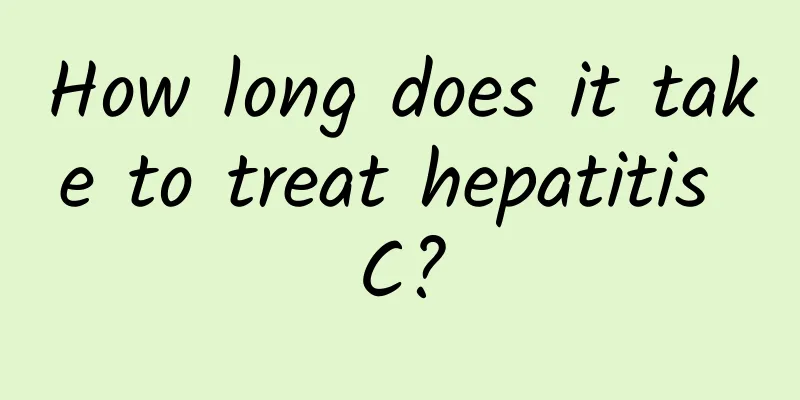How long does it take to treat hepatitis C?

|
Hepatitis C is a common liver disease that seriously endangers human health and is easily contagious. In severe cases, it can endanger the patient's life and have a great impact on society. Therefore, hepatitis C patients should actively receive treatment and strive for a speedy recovery. Many people are not very clear about the treatment of hepatitis C. The following is an introduction to the treatment of hepatitis C. Hepatitis C virus infection is the root cause of the disease. Under the influence of external factors, such as drinking, fatigue, and long-term use of hepatotoxic drugs, the disease can be promoted. The pathological changes of hepatitis C are very similar to those of hepatitis B, mainly characterized by hepatocyte necrosis and lymphocyte infiltration. Chronic hepatitis may cause hyperplasia of fibrous tissue in the portal area, and in severe cases, pseudolobules may form, leading to cirrhosis. Treatment of patients with hepatitis C virus infection (1) Acute hepatitis C: There is clear evidence that interferon treatment can reduce the chronicity rate of acute hepatitis C. It can be started 8-12 weeks after the onset of acute hepatitis caused by HCV infection, and the course of treatment is 12-24 weeks. The optimal treatment regimen has not yet been definitively determined, but early treatment is more effective for patients with genotype 1 and high viral load (>800,000 logIU/ml). (2) For patients with chronic hepatitis C, the severity of liver disease should be assessed before treatment. Patients with recurrent abnormal liver function or obvious inflammatory necrosis (G≥2) or moderate or severe fibrosis (S≥2) in liver biopsy are more likely to progress to cirrhosis and should be given antiviral treatment. (3) Hepatitis C cirrhosis ① For patients with compensated cirrhosis (Child-Pugh A grade), although their tolerance and efficacy to treatment are reduced, it is recommended that they be given antiviral treatment under close observation in order to stabilize their condition and delay or prevent the occurrence of complications such as liver failure and HCC. ② Patients with decompensated cirrhosis: Most of them find it difficult to tolerate the adverse reactions of IFNα treatment, and those who are able should undergo liver transplantation. Interferon has a good antiviral effect on acute hepatitis C, and 90% of patients can achieve complete response and recover completely; chronic hepatitis C is relatively milder than hepatitis B, and there is a chance to eliminate the virus and recover through standard antiviral treatment. Some patients may develop cirrhosis or liver cancer 20-30 years after infection. The treatment time for chronic hepatitis C is relatively short, and it can basically be cured in 4-6 months. However, if it develops into cirrhosis, it will be difficult to treat. Therefore, it is recommended that everyone pay attention to their health, pay attention to regular physical examinations, and achieve early detection and early treatment to gain more time for treatment. The earlier the treatment, the faster and simpler it will be. |
<<: Conservative treatment of right patellar fracture
>>: What are the diagnostic criteria for hepatitis C?
Recommend
The efficacy and function of pointed shellfish
Many people are familiar with Jianbei. Usually, w...
The efficacy of safflower, amazing effect
I believe everyone is very familiar with safflowe...
Symptoms of sleep apnea syndrome
If sleep apnea syndrome occurs, it is important t...
Normal reference range of hcg values for twins
We all know that twins will cause the hcg content...
What are the benefits of Thai massage? What types of Thai massage are there?
Thai massage originated in the western part of an...
Can Sjögren's syndrome cause parotid gland swelling?
Sjögren's syndrome is an autoimmune disease t...
How to measure ovulation by taking body temperature
There are many ways to measure ovulation period. ...
Varicose veins in the lower leg: five aspects to pay attention to in treatment
There are many types of varicose veins, among whi...
What's the matter with the lump in the chest and the pain?
There will be a hard lump in the chest cavity, an...
What should I do if my white blood cell count is elevated due to urinary tract infection?
When the human body suffers from a urinary tract ...
Nipple discharge during menopause
As we age, our bodies gradually age, our skin lac...
Cough Diet Therapy
Diseases such as coughing are a common symptom of...
What are the dangers of moderate anemia?
Perhaps many people do not think that anemia is a...
The reasons why menstruation is delayed need attention
Normal menstruation comes at a fixed time every m...
The efficacy and function of Chinese medicine Atractylodes macrocephala
As we all know, in terms of traditional Chinese m...









